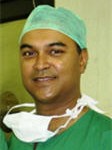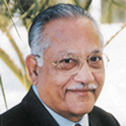
Dr. Arun Prasad
As devoted readers of this blog have noticed, the growing obesity trend is becoming an increased problem all over the world. With obesity levels skyrocketing in Europe and the U.S., more and more people are incapable of losing their excessive weight through diet and exercise. Therefore, the number of bariatric surgeries has boomed all around the world. But going through a weight loss surgery is not a walk in the park. It involves careful preparations and the right after care, a satisfactory general health, and money. Because these surgeries are expensive, and in most countries the patients might have to pay for the entire cost themselves. Therefore, a growing number of obesity patients choose to go abroad for weight-loss treatment. Some of the most popular destinations for bariatric surgeries are India, Thailand and Singapore.
I had the pleasure of meeting Dr. Arun Prasad, one of the most prominent doctors in India practicing bariatric and laprascopic surgery, at Glow 2010 in Kuala Lumpur this spring. During the tourism and wellness congress, Dr. Prasad held an excellent speech on weight loss surgeries in India in general and in Apollo Hospital in New Delhi in particular, where Dr. Prasad works as a Senior Consultant Surgeon since many years. Dr. Prasad was one of the pioneers within laprasopic surgery, and he is also one of the youngest surgeons in the world with an experience of over 5,000 laprascopic surgeries.
During my meeting Dr. Prasad at Glow 2010, I took the opportunity to ask Dr. Prasad about his work and his take on the future of weight-loss surgeries.
Your passion for your profession shone through your speech at Glow 2010. what is it that you cherish the most with being a doctor?
- What I cherish the most with being a doctor is to be able to directly help human beings reduce their suffering.
In your speech, you addressed the issue of obesity surgical tourism, an area that most experts believe will skyrocket in the future. What do you see as the main challenge with obesity surgical tourism?
- The main challenge is definitely to find centers that give a dedicated complete care for obesity.
You have previously worked in England; could you briefly compare the infrastructure, equipments, level of patient care, security and pricing in Indian hospitals to those in Europe?
- I would say that the infrastructure and the equipment level is the same. If you are talking about private hospitals, the level of patient care is a little better in India. NHS Hospitals in England have priorities of resource management and emergencies, and therefore patient choice in treatment does not get much attention. Security is not a problem at any of the places. But pricing in India is about 25% of Europe.
Today, you work as a Senior Consultant Surgeon for Indraprastha Apollo Hospital, approximately; how many international obesity patients do you cater to per year? Which is the most common treatment; gastric bypass or gastric banding?
- I cater to about 100 patients per year. Both procedures (gastric bypass and gastric banding) are equally common.
How long does your surgical obesity patients stay in the hospital, and how long after surgery do you usually follow up on each patient? How much time do you advice that the patient set aside for going through with a surgery in India?
- I advice patients to stay in the hospital between 2-5 days, depending on which procedure they are having. Another week in India after being let out of the hospital is recommended, this to have time to recuperate.
Many patients going abroad for an extensive surgery have fears before the journey; how do you as a doctor handle these fears and anxieties?
- I start with talking to them on the phone or through video conference. This instills confidence in the patients. So does communication with previous patients and our website. Medical tourism facilitators who have dealt with us previously can also talk to them, which usually lessen their fears.
How do you control the cost of healthcare in your organization?
- Market forces control the pricing level.
Lastly, for anyone with a BMI (Body Mass Index) over 30, considering an obesity surgery; what would be your best advice?
- Try diet and exercise first and if that fails, consider bariatric surgery. We usually operate patients with a BMI of 35 and above.
If you want to know more about weight-loss surgery in India, or Dr. Arun Prasad’s work; contact us at Novasans!
 On a global perspective, India is seen as one of the most cost-effective healthcare nations of the world, attracting foreign patients for its high service and quality care. Nevertheless, it is obvious that even the shining star of medical tourism has a devout debate about how to lower the cost of healthcare while maintaining or surpassing the current quality. India is surely not the only country in the world battling with the cost of healthcare and too few doctors. This is actually on of the main reasons why patients go abroad for medical and wellness treatment. As discussed many times before in this blog; this increasingly popular phenomenon is called medical tourism. If you want to find out more about medical tourism; visit the Novasans website later this year, or our Facebook page already now!
On a global perspective, India is seen as one of the most cost-effective healthcare nations of the world, attracting foreign patients for its high service and quality care. Nevertheless, it is obvious that even the shining star of medical tourism has a devout debate about how to lower the cost of healthcare while maintaining or surpassing the current quality. India is surely not the only country in the world battling with the cost of healthcare and too few doctors. This is actually on of the main reasons why patients go abroad for medical and wellness treatment. As discussed many times before in this blog; this increasingly popular phenomenon is called medical tourism. If you want to find out more about medical tourism; visit the Novasans website later this year, or our Facebook page already now!





